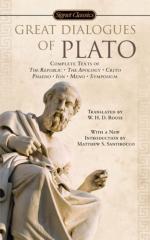
|
| Name: _________________________ | Period: ___________________ |
This test consists of 5 multiple choice questions, 5 short answer questions, and 10 short essay questions.
Multiple Choice Questions
1. The common man is not concerned with beauty itself, but ___________.
(a) He is concerned for his soul.
(b) He is concerned with beautiful things.
(c) He concerns himself with only practical matters.
(d) He is concerned with more abstract notions.
2. In Ion, Socrates concludes that Ion's ability to memorize poetry is which of the following?
(a) Not proof that he knows what it actually means.
(b) An art that he learned from others.
(c) Proof that he knows what it actually means.
(d) Divinely inspired, just like the very poets whom Ion recites.
3. To understand Ion's poetically inspired spirit, Socrates employs a metaphor of which of the following?
(a) A newly born start to explain how small and insignificant our world is in the greater picture.
(b) A dying animal to explain how the sole individual is part of a significant collective.
(c) A magnet to explain how a poet's inspiration moves from the muse to the audience.
(d) An eye attempting to see itself, explaining how our mental visions are limited by the bounds of our brain.
4. Describe Thrasymachus' view of Socrates.
(a) He can't follow Socrates' logic.
(b) He likes the Socratic method of reasoning.
(c) He chastizes Socrates for asking questions freely, but dodging them when he is asked a question himself.
(d) He hates Socrates and thinks Socrates is stupid.
5. To which other creative art does Socrates propose censorship?
(a) Mathematics.
(b) Music.
(c) History.
(d) Dance.
Short Answer Questions
1. What are the soldiers of the republic explicitly forbidden to do, according to Socrates?
2. Whose stories does Socrates think dangerous for the moral turpitude of his city's citizens?
3. In order to respond to Glaucon's objections, Socrates ___________________.
4. In the beginning of Book IV, Adeimantus ask Socrates__________________.
5. According to Socrates' view of justice, a ruler should always:
Short Essay Questions
1. What does Glaucon argue for?
2. What would happen, according to Socrates, if a cobbler exercised the role of a leader?
3. What is the crucial difference, according to Socrates, between the common man and the philosopher?
4. Explain Plato's theory of knowledge as recollection.
5. What is the purpose of Alcibiades late-night intrusion into the Symposium? What does he talk about?
6. Whom does Socrates think is to be chosen to rule the city and why?
7. What is the purpose of Aristophanes' myth about men and women once being unified and then split apart? How does he end his story?
8. Does Socrates believe that his theoretical republic is a realistic political plan for a city?
9. Explain the irony of the following statement as it relates to Ion: "Plato is the supreme enemy of art and is also the supreme artist."
10. Is The Republic only interested in individual justice?
|
This section contains 1,387 words (approx. 5 pages at 300 words per page) |

|




